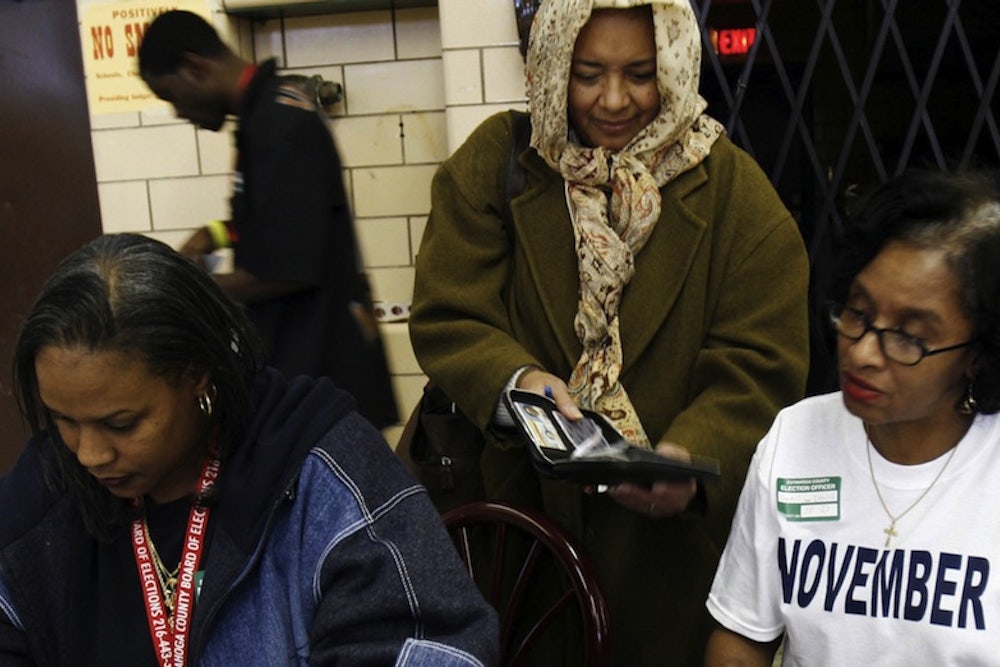Texans casting a ballot on Monday, when early voting begins, will need to show one of seven forms of photo ID. A concealed handgun license is okay, but a student ID isn't. The Supreme Court on Saturday allowed Texas to go forward with this controversial voter ID law. A federal judge had previously struck down the law, arguing that it could disenfranchise 600,000 voters or a full 4.5 percent of registered voters, many of them black and Latino.
Critics say voter ID laws, especially the one in Texas, amount to voter suppression, because it can be both difficult and costly to get the required identification. In a powerfully worded dissent, Justice Ruth Bader Ginsburg, joined by Sonia Sotomayor and Elena Kagen, wrote, “The greatest threat to public confidence in elections in this case is the prospect of enforcing a purposefully discriminatory law, one that likely imposes an unconstitutional poll tax and risks denying the right to vote to hundreds of thousands of eligible voters.”
Saturday’s decision marks the third time this season that the Supreme Court has allowed a controversial voter law to take effect. The other two were about measures in Ohio and North Carolina. This may not seem surprising, given that the Robert Court has struck down a key section of the Voting Rights Act, but the rationale for this (and the other decisions) may have been more about timing than substance—in particular, observing the precedent of Purcell v. Gonzalez, in which the Court has blocked last-minute changes in voting laws in order to avoid confusion. Still, what's worse? A confused voter or a disenfranchised one? The latter, Ian Millhiser argued at ThinkProgress: "If a confused voter brings an ID to the polls that they do not need to have, they will still get to cast a ballot. But if the same voter mistakenly forgets their ID (or fails to obtain one) because they were confused and believed that their state’s voter ID law was not in effect, then they will be disenfranchised."
Actual voter fraud, which is the problem that Republican legislation supposedly addresses, is difficult to find. Ginsburg noted that there were "only two in-person voter fraud cases prosecuted to conviction" in Texas in almost a decade. The consequences of voter ID laws, on the other hand, are much easier to track. According to the nonpartisan Government Accountability Office, existing ID requirements reduced turnout in some states during the last presidential election, particularly among young and black voters. Now, imagine the impact is even larger, because it is spread over the 33 states that now require some form of photo ID to vote. The same report found that the costs of acquiring the needed ID ranged between $14.50 to $58.50 for 17 of the states.
—Rebecca Leber
News from the weekend
EBOLA: The U.S. now has an Ebola czar, and Jonathan Cohn describes his credentials. The Pentagon has a medical response team in place to be deployed in America if there are any other Ebola diagnoses. So far, every suspected Ebola scare has turned up negative. (USA Today) And as of early Monday morning, 48 people who’d had contact with Timothy Duncan in Texas have finished the 21-day waiting period for Ebola—and none appears to have disease. (NBC News) Harold Pollack wonders if maybe the public health system is working after all. (Politico)
SAME-SEX MARRIAGE: The federal government announced it would recognize same-sex marriages in the five states affected by the Supreme Court’s tacit approval of state laws overturning same-sex marriage bans. (Evan Perez, CNN)
MORE LGBT NEWS: Bishops and cardinals ended up removing the revolutionary paragraphs in an earlier document that would have embraced remarried and same-sex couples as "partners." (John L. Allen, The Crux)
ECONOMY: Federal Reserve chairwoman Janet Yellen voiced concern over rising inequality, saying the divide is threatening the country’s economic performance. (Pedro Nicolaci Da Costa, Wall Street Journal)
Articles worth reading
Long read of the day. Laurie Abraham writes a deeply personal, thoughtful essay about the stigma surrounding abortion, even though close to one in three women undergoes the procedure before turning 45. (Elle)
Investigative piece of the day. Shanon Lerner pokes around a town in Florida that saw brain cancer jump 550 percent among girls. Who’s to blame? (The Nation)
Going to the ground game. Recent polls don't look so hot for the Democrats, but Greg Sargent thinks early voting might give struggling candidates an unexpected boost. (Washington Post)
Big, fat nothing. Researchers are close to creating black hole in a laboratory. OK, is anybody else worried about this? (Ron Cowen, Scientific American)
At QED
Jonathan Cohn weighs the nuanced arguments for and against a travel ban on West African countries. Meanwhile, Rebecca Leber has advice for media outlets on how to report about Ebola: calmly. Howard Markel remembers the 1892 cholera scare, which turns out to have a lot in common with today’s ebola scare. Still concerned? Danny Vinik says the best thing you can do is get a flu shot.
Links compiled by Claire Groden and Naomi Shavin.
